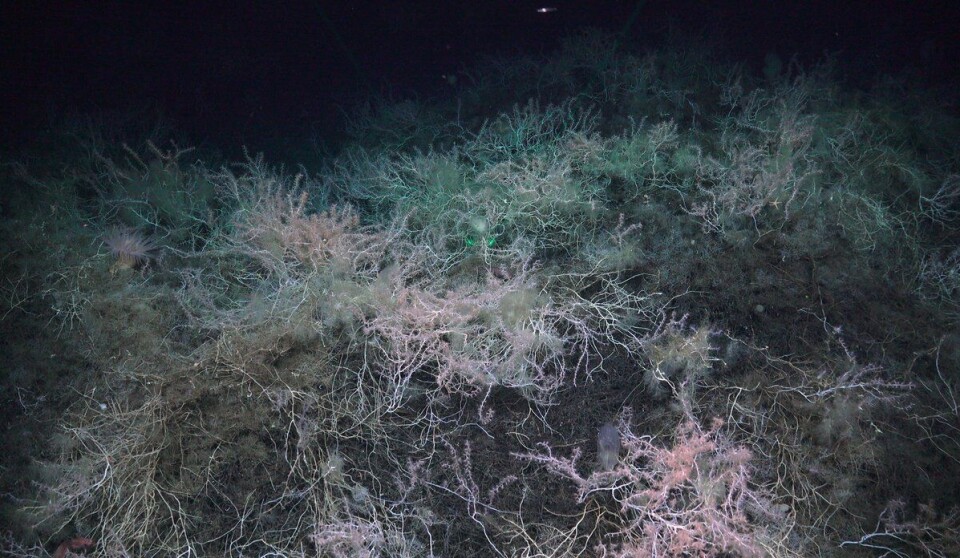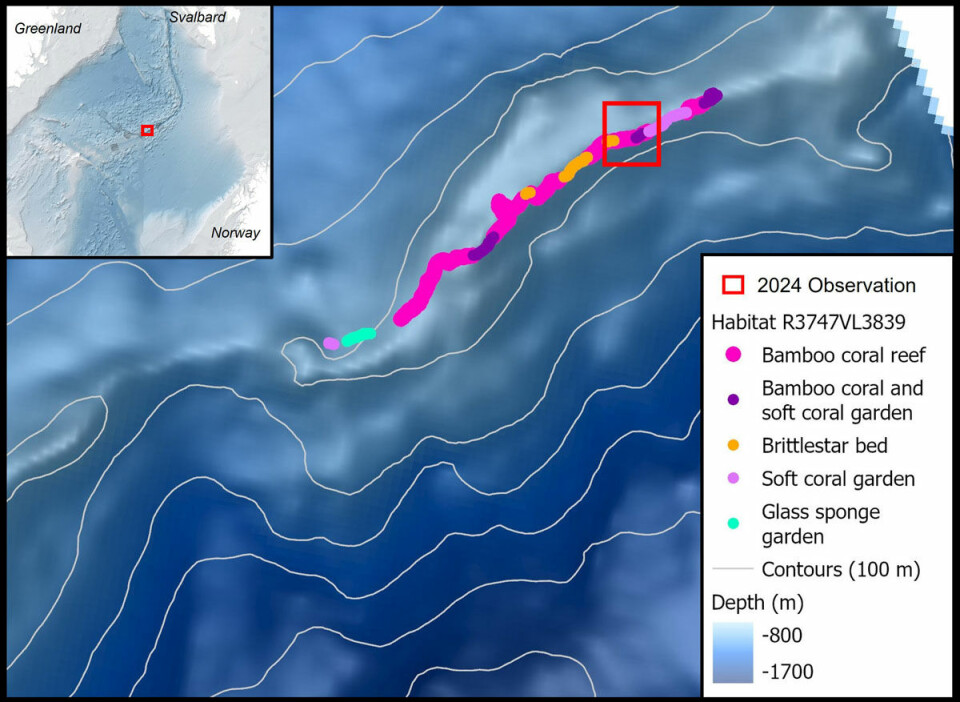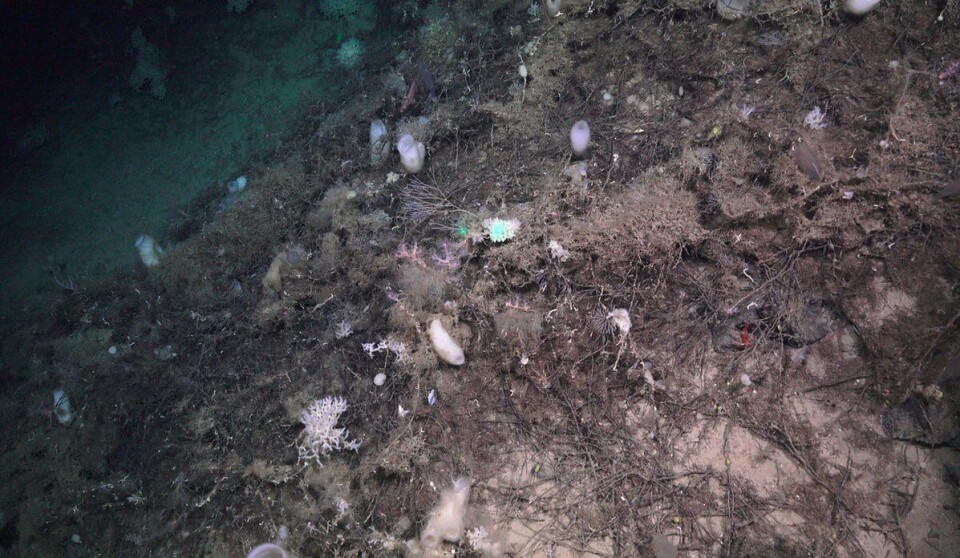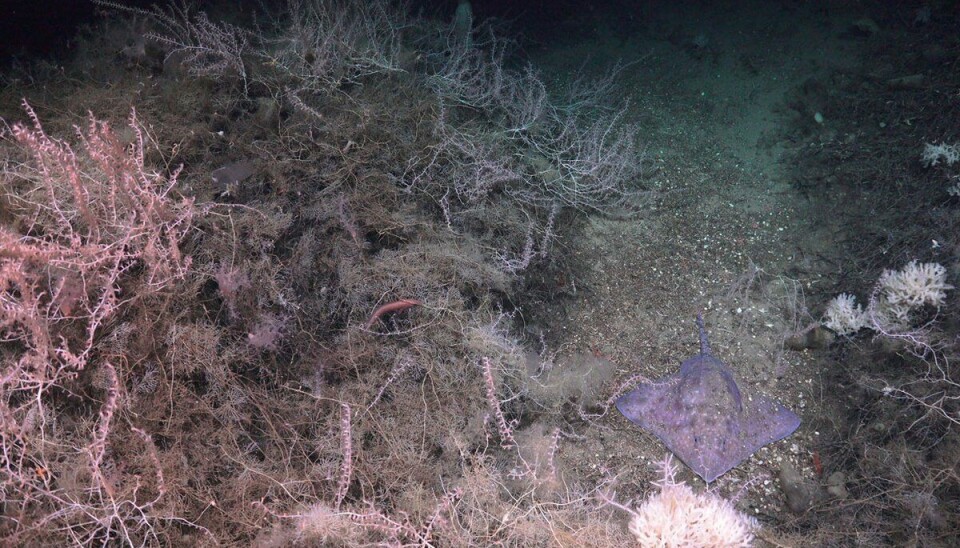THIS CONTENT IS BROUGHT TO YOU BY the Institute of Marine Research - read more
Have researchers found the world’s first bamboo coral reef?
The possible reef stretches over 800 metres in the Norwegian Sea.

“As far as we know, this is the first time it's been documented that bamboo coral may also form reefs,” says Heidi Kristine Meyer.
She is a marine researcher at the Institute of Marine Research.
“If it turns out that the discovery does not fall within the definition of a reef, it's still the densest occurrence we have seen of these corals over such a large area,” she says.

Forests and reefs of bamboo coral
Meyer is currently on the Mareano expedition along the Arctic Mid-Ocean Ridge (AMOR) far out in the Norwegian Sea.
The researchers are mapping the seabed in the area, mainly through filming by a remotely operated vehicle.
“We expected to find a bamboo coral garden, where the corals grow directly from the seabed in dense clusters,” says Meyer.
When the team started filming at the top of the underwater ridge, the corals appeared quickly, just as expected. But then came a surprise.
“When we first started noticing the bamboo coral, they showed in patches. But then the patch became thicker and more dense and we noticed they were growing almost everywhere – on rocks, slopes, and sediment. Then we discovered that these corals also grow on top of dead corals – which is a sign that they form reefs,” Meyer explains.
When bamboo corals die, their skeletons remain, resembling thin, dried branches. In species that form reefs, it's common for living corals to grow on top of the dead ones.

“At one location, there was an opening in the reef that allowed us to measure the thickness from the bottom up to the living corals. It turned out to be 63 centimetres, which suggests that the reef may be old. To determine the exact age, samples from the dead corals must be examined," says Meyer.
No previous documentation of such a find
The biologists on board the research vessel Kronprins Haakon have combed through scientific literature in search of other reefs made up of bamboo coral.
They have not found any.
“As far as we can tell, this is the first documented case of bamboo corals growing on its dead coral skeletons – in the same way as, for example, the cold water coral Desmophyllum pertusum. This species has built the large Norwegian coral reefs known from earlier,” says Meyer.
Thriving marine life around the bamboo corals
As with other coral reefs, there is also abundant marine life on the newly discovered bamboo coral reef.
“In addition to the corals, we've observed many ascidians, anemones, sponges, hydrozoans, bryozoans, gastropods, bivalves, decapods, and the fish species Arctic rockling (Gaidropsarus argentatus) and Arctic Skate (Amblyraja hyperborea)," the researcher says.

Skate eggs and juvenile skates were also seen around the reef, which suggests that the area may serve as a nursery ground for this species.
A mystery to be solved
When the researchers return to land, the work of analysing the findings from the expedition will continue.
“We still don’t know exactly which species of bamboo coral grows in this area. Based on slightly different habitats, we suspect that there are several different species in Norwegian waters. We've collected samples of the species growing here in the Norwegian Sea – these will likely give us the answer,” says Meyer.
It also remains to be determined whether the observed bamboo corals grow in a manner that fulfils the criteria for classification as a reef.

This content is paid for and presented by the Institute of Marine Research
This content is created by the Institute of Marine Research's communication staff, who use this platform to communicate science and share results from research with the public. The Institute of Marine Research is one of more than 80 owners of ScienceNorway.no. Read more here.
More content from the Institute of Marine Research:
-
These whales have summer jobs as ocean fertilisers
-
Herring suffered collective memory loss and forgot about their spawning ground
-
Researchers found 1,580 different bacteria in Bergen's sewage. They are all resistant to antibiotics
-
For the first time, marine researchers have remotely controlled an unmanned vessel from the control room in Bergen
-
New discovery: Cod can adjust to climate change – from one generation to the next
-
Researchers have discovered a new deep-sea octopus at a depth of 2,500 metres




































